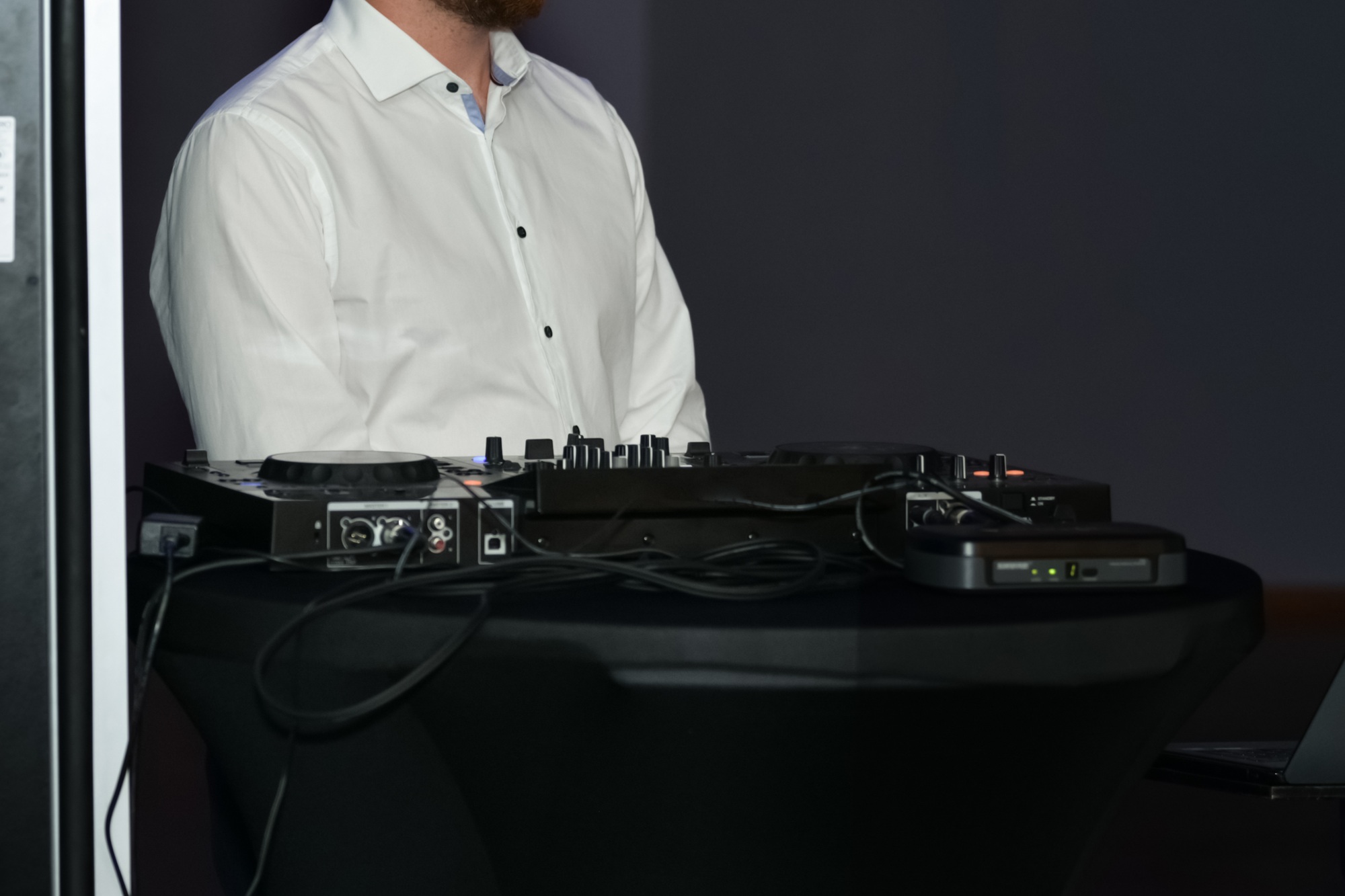Key Takeaways

- Research and Planning: Conduct thorough market research to understand local wedding trends and outline a detailed business plan that includes goals, pricing, and service offerings.
- Quality Equipment: Invest in high-quality sound systems, DJ controllers, and backup equipment to ensure professional performance during events.
- Effective Marketing: Utilize social media and a professional website to promote your services, attract clients, and highlight unique offerings through engaging content.
- Networking with Vendors: Build relationships with local wedding planners and vendors to collaborate on referrals and enhance your service visibility.
- Exceptional Client Experience: Focus on creating memorable experiences by mastering your DJ equipment, engaging with the audience, and being adaptable to client requests.
- Legal Compliance: Ensure to acquire necessary licenses and permits for operating legally, and consider insurance to protect your business from potential liabilities.
Starting a wedding DJ business can be an exciting venture that combines your passion for music with the joy of celebrating love. With countless couples looking for the perfect soundtrack to their big day, there’s never been a better time to dive into this thriving industry. Whether you’re a seasoned DJ or just starting out, understanding the essentials can set you on the path to success.
From selecting the right equipment to marketing your services effectively, launching your wedding DJ business requires a blend of creativity and strategy. You’ll need to master the art of reading the crowd and curating playlists that keep the dance floor packed. If you’re ready to turn your passion into a profitable business, let’s explore the steps you need to take to make your dream a reality.
How to Start a Wedding DJ Business

Starting a wedding DJ business involves several key steps that ensure success in the competitive market.
- Research Your Market
Research local wedding trends and popular DJ styles in your area. Identify your target audience’s preferences and analyze competitors.
- Create a Business Plan
Outline your vision for the business. Include goals, services offered, pricing strategies, and marketing plans. Consider startup costs and potential profits.
- Select Equipment
Choose high-quality audio gear and mixing equipment. Invest in microphones, speakers, headphones, and lighting to create a professional setup.
- Build a Music Library
Curate a diverse playlist that caters to various wedding themes. Include popular songs and timeless classics to meet client expectations.
- Develop Marketing Strategies
Utilize social media and website platforms to promote your services. Create engaging content that highlights your unique offerings. Consider joining wedding directories to increase visibility.
- Network with Vendors
Establish relationships with local wedding planners, venues, and other vendors. Collaborate to refer clients and enhance service offerings.
- Gain Experience
Start by DJing smaller events or offering discounted services to build experience and gather testimonials. Use feedback to improve your skills and service quality.
- Acquire Necessary Licenses
Research local regulations concerning music licensing. Secure necessary permits to operate legally, ensuring compliance with copyright laws.
- Provide Exceptional Service
Focus on creating memorable experiences for clients and their guests. Prioritize communication, reliability, and professionalism throughout the event.
- Solicit Reviews and Referrals
Encourage satisfied clients to leave reviews. Word of mouth from happy couples will bolster your reputation and attract new clients.
Understanding the Wedding DJ Industry

The wedding DJ industry encompasses music and entertainment services tailored for weddings. A successful wedding DJ creates memorable experiences, ensuring guests remain engaged throughout the event.
Overview of the Wedding DJ Market
72% of brides choose professional mobile DJ entertainers for their weddings. The demand for wedding DJs reflects an essential element in wedding planning, as they provide vibrant atmospheres and enhance guest experiences. The average cost of a wedding DJ varies. In 2022, the national average cost reached $1,500, while in 2021 it was $1,400. Recent trends indicate the cost has increased to approximately $1,700 due to inflation and high demand, underscoring the wedding DJ service as a viable small business opportunity.
Key Trends in Wedding Entertainment
Music personalization and cultural diversity play prominent roles in wedding entertainment trends. Couples increasingly seek unique playlists that reflect their identities or themes. Additionally, the integration of technology such as live mixing and lighting effects enhances the overall experience. Live streaming options have also emerged, allowing remote guests to participate in the festivities. Understanding these trends can significantly impact your wedding DJ business’s appeal and relevance in a competitive market.
Planning Your Wedding DJ Business
Planning involves crucial steps to create a successful wedding DJ business. Focus on defining your niche and establishing business goals to guide your entrepreneurial journey.
Defining Your Niche
Identify your unique selling points. Explore various music styles such as classic rock, pop, or country that align with client preferences. Consider offering additional services like photo booths or lighting effects to enhance your appeal. Survey local competitors to understand their offerings and identify gaps in the market where you can excel. Choose a niche that reflects your passion while catering to diverse client needs.
Setting Your Business Goals
Outline clear and measurable business goals. Include short-term objectives such as securing a number of gigs within the first year and increasing your client base by a certain percentage. Plan long-term targets like expanding service offerings or improving equipment and technology. Implement a timeline for each goal to track progress and make adjustments. Establishing defined goals shapes your approach and drives growth for your small business.
Materials and Tools Needed
Starting a wedding DJ business requires specific equipment and supplies to deliver high-quality services. Below are the essentials for your success.
Essential DJ Equipment
- Sound System: Invest in a high-quality PA system that includes an amplifier and speakers to ensure clear and powerful sound for guests. Look for systems rated at least 500 watts for adequate volume in larger venues.
- DJ Controller or Mixer: Utilize a reliable DJ controller or mixer for seamless blending and transitioning between tracks. Choose models with at least four channels to allow for diverse mixing options.
- Headphones: Select closed-back headphones for monitoring tracks without sound leakage. Aim for a frequency response range of 20 Hz to 20 kHz for optimal audio clarity.
- Microphones: Purchase both wired and wireless microphones for versatility during events. Aim for clear sound quality in various settings.
- Backup Equipment: Maintain a backup sound system and essential cables to handle any technical difficulties. Plan for at least one backup option for each critical piece of equipment.
Additional Supplies and Accessories
- Music Library: Build a diverse music library containing at least 1,000 tracks covering various genres and eras. Focus on popular wedding songs to meet client preferences.
- Lighting Equipment: Integrate basic lighting systems such as LED uplights and moving heads to enhance the atmosphere. Plan for three to five lighting fixtures for medium to large events.
- Cables and Adapters: Collect necessary cables and adapters that accommodate different equipment setups. Keep a range of XLR, RCA, and 1/4″ cables for flexibility.
- Portable Tables and Stands: Use sturdy tables and stands for your DJ setup, ensuring mobility and ease of transport. Choose lightweight options that can support your equipment comfortably.
- DJ Software: Invest in professional DJ software that allows track organization and easy mixing. Consider programs like Serato DJ or Traktor Pro that cater to various skill levels.
Equipping yourself with the right materials and tools not only enhances your performance but also builds trust with clients seeking a memorable experience at their special events.
Building Your Brand
Creating a Unique Business Name
Your business name acts as your first impression. Select a name that resonates with your target audience and reflects your unique style. Ensure your name is memorable and easy to spell, facilitating word-of-mouth referrals and online searches. Verify the availability of the name within your local area and check social media platforms to maintain consistency across all channels. A well-chosen name forms the foundation of your brand identity.
Designing Your Logo and Marketing Materials
Your logo and marketing materials visually convey your brand. Invest in a professional logo that encapsulates your personality and services as a wedding DJ. Use a color scheme that reflects the emotions and themes commonly associated with weddings. Create engaging marketing materials, such as business cards, flyers, and promotional graphics, to enhance your visibility. Ensure consistency in design across all platforms to establish a cohesive brand presence. Utilize these marketing tools to communicate your unique selling points and connect effectively with potential clients.
Legal Requirements
Establishing a wedding DJ business involves adhering to specific legal requirements. Addressing these aspects ensures compliance and smooth operation.
Registering Your Business
Register your business by following these steps:
- Register your business name with your state government.
- Obtain a federal tax identification number (EIN) from the Internal Revenue Service (IRS).
- Obtain a state tax identification number.
- Register for a business license with your locality if required.
- Obtain any other necessary licenses and permits, which can vary by state and local regulations.
Understanding Licenses and Permits
Understand the necessary licenses and permits to operate legally. Common permits can include:
- Business licenses that confirm your authority to engage in commercial activities.
- Specific event permits that may be required for outdoor or large gatherings.
- Music licensing necessary for playing copyrighted material, often obtained through organizations like ASCAP, BMI, or SESAC.
Insurance Considerations
Consider insurance to protect your business from potential liabilities. Important types of insurance include:
- General liability insurance covering accidents or injuries occurring during events.
- Equipment insurance protecting your investment in DJ gear from damage or theft.
- Professional liability insurance safeguarding against claims of negligence or inadequate service during events.
Pricing Your Services
Establishing competitive pricing structures ensures your wedding DJ business attracts clients while remaining profitable. Focus on aligning your prices with industry standards and client expectations.
Researching Competitor Pricing
Research competitor pricing to understand the market and determine appropriate rates. Consider the following steps:
- Examine local offerings: Identify wedding DJs in your area and analyze their service packages. Look at their music styles and additional options to gauge pricing variations.
- Differentiate pricing models: Compare common pricing models such as flat-rate fees that encompass setup and performance. Consider how hourly rates might apply for shorter events or flexible timelines. Note any extra charges for services like lighting or specialty equipment.
- Document pricing structures: Create a spreadsheet to track competitor rates alongside their offerings. This approach helps visualize pricing trends and informs your decisions.
Creating Service Packages
Create comprehensive service packages that cater to various client needs. Follow these guidelines for effective package design:
- Bundle key services: Combine essential services such as sound equipment, lighting, and setup within each package. This strategy simplifies decision-making for clients while enhancing your appeal.
- Offer tiered options: Provide multiple package levels—basic, standard, and premium. Each level should include increasing features such as additional hours of service, upgraded equipment, or added lighting effects.
- Include add-on services: Incorporate optional extras like photo booths or special playlists as add-ons. This flexibility allows clients to customize their experience, further increasing overall satisfaction.
By incorporating these elements into your pricing strategy, you create transparent and attractive service packages that resonate with potential clients.
Marketing Your Wedding DJ Business
Effective marketing strategies play a vital role in the success of your wedding DJ business. They help create awareness and attract potential clients, establishing your reputation in a competitive market.
Establishing an Online Presence
Create a professional website that showcases your DJ services, music samples, and client testimonials. Include an engaging blog that discusses wedding trends to drive traffic and improve search engine rankings. Ensure your website is mobile-friendly since 50% of web traffic comes from mobile devices. Utilize SEO techniques by incorporating relevant keywords, enhancing visibility, and attracting traffic organically.
Utilizing Social Media
Leverage social media platforms like Instagram, Facebook, and TikTok to showcase your work and connect with potential clients. Post videos of events, highlight client feedback, and share behind-the-scenes content. Engage with followers by responding to comments and messages promptly. Use targeted ads to reach specific demographics in your area, increasing your exposure to engaged couples.
Networking with Wedding Vendors
Build relationships with local wedding vendors, such as photographers, caterers, and venues. Attend wedding expos and industry events to connect face-to-face. Collaborate on events or promotions; referral partnerships can lead to increased bookings. Join local wedding industry groups to stay informed about trends and share resources, contributing to the growth of your small business in the wedding market.
Booking Your First Wedding
Successfully booking your first wedding involves thorough preparation and effective communication. Each step plays a crucial role in establishing your reputation as a wedding DJ.
Preparing for Consultations
Gather specific information about the couple’s vision and requirements before the consultation. Conduct initial research on their wedding venue and guest count to provide tailored advice. Arrange clear communication methods like video calls or in-person meetings. Highlight the importance of understanding their music preferences and special requests. Prepare a comprehensive list of questions to guide the discussion and ensure no detail is overlooked.
Creating an Impressive Playlist
Craft an impressive playlist that caters to various tastes and wedding themes. Start by discussing favorite genres and important songs with the couple. Include popular love songs, upbeat dance tracks, and classics to engage guests. Keep the flow of music in mind, transitioning smoothly for different wedding segments. Utilize user-friendly DJ software to organize tracks efficiently. Be open to adjusting playlists based on crowd reactions, ensuring an enjoyable experience throughout the event.
Delivering an Unforgettable Experience
Creating an unforgettable experience for clients and their guests stands at the core of a successful wedding DJ business. Each aspect of performance contributes significantly to the overall atmosphere and satisfaction of the event.
Mastering the DJ Equipment
Mastering DJ equipment enhances performance quality and listener enjoyment. Familiarity with essential gear such as a high-quality sound system, DJ controller, mixer, and microphones significantly boosts your effectiveness as a DJ. Understanding software tools that offer seamless transitions and track manipulation proves invaluable.
Adapting to the venue’s acoustics ensures optimal sound distribution; utilizing equalizers and sound mixers tailored for specific environments can greatly improve audio quality. Keeping backup equipment ready allows for immediate troubleshooting during events. Continuous practice with your setup leads to effective management of technology, minimizing distractions and focusing on entertainment.
Engaging with the Audience
Engaging with the audience ensures a lively and memorable atmosphere. Observing guest reactions allows for real-time adjustments in music selection, facilitating smoother transitions between songs. Mixing genres, from romantic ballads to chart-topping hits, addresses diverse musical preferences and keeps attendees excited.
Interaction through announcements, fun activities, or even personalized song dedications enhances emotional experiences. Through crowd engagement techniques, such as encouraging participation in dance-offs or sing-alongs, you create a vibrant and joyful celebration. Proactively soliciting feedback from guests helps tailor the experience, ensuring lasting positive impressions.
Troubleshooting Common Issues
Navigating challenges is crucial to maintaining a successful wedding DJ business. Two common issues include managing technical difficulties and handling client expectations.
Managing Technical Difficulties
- Prepare backup equipment. Carry spare audio controllers, microphones, and cables to resolve failures during events seamlessly.
- Understand your equipment. Familiarize yourself with all components to troubleshoot problems quickly.
- Conduct sound checks. Set up and test audio systems at venues beforehand to identify potential issues before guests arrive.
- Invest in reliable software. Utilize known DJ software to minimize glitches and enhance playlist management.
- Stay calm. Maintain composure in the face of technical challenges to instill confidence in clients and guests.
Handling Client Expectations
- Communicate clearly. Discuss all details, including music preferences and event timelines, during initial consultations.
- Provide updated playlists. Share sample playlists with clients to ensure their musical taste aligns with the selections.
- Set realistic timelines. Outline when certain elements of the event will occur, like first dances and cake cutting, to manage expectations.
- Be adaptable. Emphasize your willingness to adjust playlists based on crowd reactions and guest requests during the event.
- Solicit feedback. Encourage clients to provide input post-event to identify areas for improvement and reinforce your commitment to their satisfaction.
Conclusion
Starting a wedding DJ business can be a fulfilling venture that allows you to share your passion for music while creating unforgettable experiences for couples on their special day. By focusing on quality equipment, effective marketing, and exceptional service, you’ll set yourself apart in this competitive industry.
Remember to build a strong brand identity and establish clear pricing strategies that reflect your unique offerings. As you gain experience and refine your skills, you’ll not only attract clients but also create lasting memories for them and their guests. Embrace the journey ahead and let your creativity shine as you embark on this exciting path.
Frequently Asked Questions
What is the demand for wedding DJs?
The demand for wedding DJs is high, as 72% of brides choose professional mobile DJs for their special day. This trend highlights the growing need for skilled DJs to create vibrant atmospheres during wedding celebrations.
What equipment do I need to start a wedding DJ business?
To start a wedding DJ business, you’ll need high-quality audio equipment, including a DJ controller or mixer, microphones, headphones, and backup systems. Additionally, consider having portable tables, a diverse music library, lighting equipment, and professional DJ software.
How can I market my wedding DJ services?
Effective marketing strategies include establishing a professional website, utilizing social media platforms like Instagram and Facebook, and networking with local wedding vendors. Showcasing your work and gathering client testimonials can significantly enhance your visibility.
What legal requirements are there for starting a DJ business?
You need to register your business, obtain necessary licenses and permits, and understand music licensing requirements. Additionally, getting insurance, such as general liability and equipment insurance, is crucial for protecting your business.
How do I set competitive pricing for my services?
Research local competitors and their pricing structures to establish competitive rates. Consider creating service packages that bundle key offerings and provide tiered options. This approach helps you cater to different needs and enhances transparency.
How can I build a brand for my wedding DJ business?
Create a unique business name that resonates with your target audience. Design a professional logo and marketing materials that reflect your style. Ensure consistency in branding across all platforms to establish a cohesive and memorable presence.
What steps should I take when booking my first wedding?
When booking your first wedding, gather information about the couple’s vision, research the venue, and prepare questions for consultation. Creating a versatile playlist that aligns with different wedding themes ensures a smooth experience for the couple and their guests.
How can I handle technical difficulties during an event?
To manage technical issues, prepare backup equipment and conduct sound checks before the event. Stay calm and communicate clearly with your clients, making necessary adjustments to maintain a seamless experience for everyone present.
Image Via Envato: o1559kip, MPPLLC45, aetb



